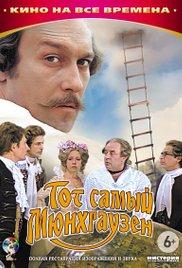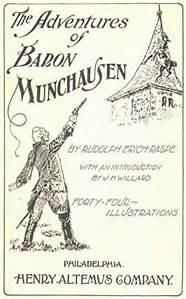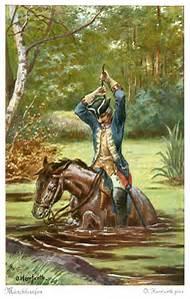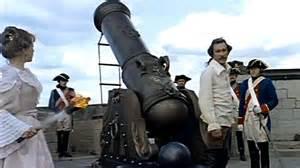 Kindle
Kindle This Russian version of the renowned Munchhausen adventures is, by far, the best of them all, both in print and on stage — though perhaps ‘the best’ doesn’t mean much in this case, since a one-eyed person can always be the king in the blinds’ realm. No: The very same Münchhausen is far above other attempts to bring Raspe’s literary work to screen, and the script by Grigoriy Gorin is also far above the book.
This Russian version of the renowned Munchhausen adventures is, by far, the best of them all, both in print and on stage — though perhaps ‘the best’ doesn’t mean much in this case, since a one-eyed person can always be the king in the blinds’ realm. No: The very same Münchhausen is far above other attempts to bring Raspe’s literary work to screen, and the script by Grigoriy Gorin is also far above the book.
Baron Karl Hyeronymous von Münchhausen was an interesting, real-life German personage from 18th century who, as history has it, used to entertain his audience with the exaggerated tale — nay, with blatantly impossible stories about his travels and adventures, though these were told in such matter-of-factly way that it would be quite unfair to designate him as a mere liar. Out of this baron and his tales, another no less interesting character surnamed Raspe, an ‘impudent scoundrel’, wrote and sent to print a number of editions of a book (whose authorship he wouldn’t acknowledge) under titles like Outrageous adventures of baron Munchausen that, in years to come, would became a classic in the genre of marvelous travels, in par with Gulliver or Crusoe.

Now, how do you classify a such a movie? When fantasy, adventure, absurd, humor and even a shade of science fiction are used to provide the spectator with moral and philosophical questions, there is no genre cage for the result; no standard to compare it with. Yet, Tot samyj Mjunkhgauzen‘s worth is beyond discussion, and I daresay it is a true gem, a masterpiece, albeit a rather unknown one.


Nevertheless, there is one person, and only one, who trusts him blindly and unquestioningly: his endearing servant, whose faith beyond doubt and whose loyalty without boundaries are poingnant. His affection for the master is admirably pure, unstained by doubt or mistrust, and in this sense he is above Karl’s own fiancée, Marta, who -despite her love- does not fully believe him; not quite. Surely she is devoted to him; she loves his uniqueness, his amusing, romantic and fun character; but her practical instinct is almost as powerful as this love, and both forces inside her hold a struggle that, in the end, becomes heroic: in one of the most touching scenes, she is forced to decide whether to remain faithful to Münchhausen and sentence him to death, or to treason him in order to spare his life.
But what would be a Russian movie without tears? There are a few beautiful and endearing moments, like that when Karl is cornered by the dull society and, out of love for Marta, must renounce to himself and give up the most valuable thing for him in life, which is truth — paradoxically. And because he is such a likeable fellow, we immediately sympathise with him, and we can’t help being moved by his disgrace.
Thus, by and by, the action leads us skillfully and gracefully, with a double sommersault of the absurd, towards a puzzling quandary, a question that might overshadow Hamlet’s doubts, a challenge to any person who has ever been concerned by the problem of coherence and personal honesty. Because to fight and sacrifice for the sake of truth or other highly esteemed values and morals is trivial in the heroes’ world; but to fight and sacrifice for the reality of fantasy… this I have never seen before, except perhaps in Cervantes’ Quixote. Grigoriy Gorin’s Münchhausen might thus be one of the biggest heroes ever.


